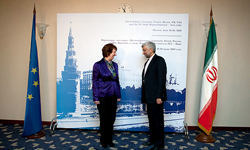 MOSCOW (AFP) - World powers meet negotiators from Iran in Kazakhstan on Tuesday in the hope of curbing Tehran's nuclear ambitions by advancing a "significant" new offer, despite low expectations of a breakthrough after years of dashed hopes.
MOSCOW (AFP) - World powers meet negotiators from Iran in Kazakhstan on Tuesday in the hope of curbing Tehran's nuclear ambitions by advancing a "significant" new offer, despite low expectations of a breakthrough after years of dashed hopes.The meeting under the shadow of the Tien Shan mountains in the Kazakh city of Almaty comes as sanctions bite against the Islamic republic and Israel still refuses to rule out air strikes to knock out Iran's suspected nuclear weapons drive.
Little apparent progress has been made since the last such session of talks in Moscow in June 2012 ended without any breakthrough and the crux of the dispute remains Iran's insistence on not abandoning uranium enrichment operations.
Western diplomats have said that Iran will be presented with an offer with significant new elements to coax it into a concession and end a stalemate that has lasted almost unchanged since 2002.
"We are approaching these talks with a sense of urgency. But this is not necessarily a sprint," one Western diplomat said.
Western capitals have been tight-lipped about the nature of the offer but it reportedly may involve an easing of sanctions on Iran's gold and precious metals trading in exchange for the closure of a major uranium enrichment plant.
Iran wants sanctions lifted before it negotiates and demands recognition of its right to enrich uranium to levels that could feed its electricity grid and provide isotopes for a medical research plant.
- 'The positions are too far apart' -
The atmosphere has already been clouded by a UN nuclear watchdog report saying Iran started installing next-generation centrifuges at its Natanz nuclear plant, a move Washington said would be "provocative".
"Both sides want a deal, but on their own terms," said International Institute for Strategic Studies analyst Mark Fitzpatrick.
"Neither wants a deal badly enough to make the concessions that would be required." The United States in particular has suggested through Vice President Joe Biden the idea of direct talks with its arch foe without preconditions.
"Right now, the West is coming across as more eager to move the process forward, but without offering anything that Tehran finds valuable," said Trita Parsi of the National Iranian American Council and author of "A Single Roll of the Dice - Obama's Diplomacy with Iran."
Iran's supreme leader Ayatollah Ali Khamenei, who has the last say in all foreign policy matters, has effectively rejected the offer of direct US talks and appeared to order a tough line in Almaty.
"Iran is unlikely to accept any deal that requires it to stop enriching uranium, and is unlikely to accept a deal in which it gives away its major bargaining chips but still faces severe sanctions," said Royal United Services Institute analyst Shashank Joshi.
Khamenei defiantly claimed earlier this month that even though Iran has no intention of developing nuclear weapons, the United States could not thwart Tehran if it wanted to.
"The positions for the moment are just too far apart," said a top European diplomat in Tehran.
- 'Israel's red line' -
The talks involve the so-called 5+1 world powers on one side - Britain, China, France, Germany, Russia and the United States - and Iran's team led by top nuclear negotiator Saeed Jalili on the other.
The talks also come with the lingering threat of Israel launching a unilateral strike on Iran just as it had done against the Osirak nuclear reactor in Saddam Hussein's Iraq in 1981.
Such action would almost certainly drag the United States into a conflict it clearly wants to avoid and leave the global economy in peril due to the impact on the price of oil.
Strikes would also risk sparking a broader Middle East conflict - a danger the region can hardly afford with the violence now raging in Syria.
Joshi said Israel's "red line" would be a decision by Iran to enrich uranium above its current upper limit of 20 percent - within reach of weapons-grade uranium but necessary for Iran's medical research.
Uranium enrichment is of particular concern to world powers as it can be used to make nuclear fuel and the explosive core of a nuclear bomb.
Iran already has a nuclear power plant in the southern city of Bushehr - built with Russian help - but Khamenei has described atomic weapons as a "sin".
Analysts said all sides at this stage agree that the cost of all-out war would be too great even if Washington has resolved to keep all options open.
"Iran is unlikely to breach the Israel red line," said Joshi. "And if it does, Israel still has incentives to avoid action and pass responsibility to the United States."
By The Nation
The Iran Project is not responsible for the content of quoted articles.










